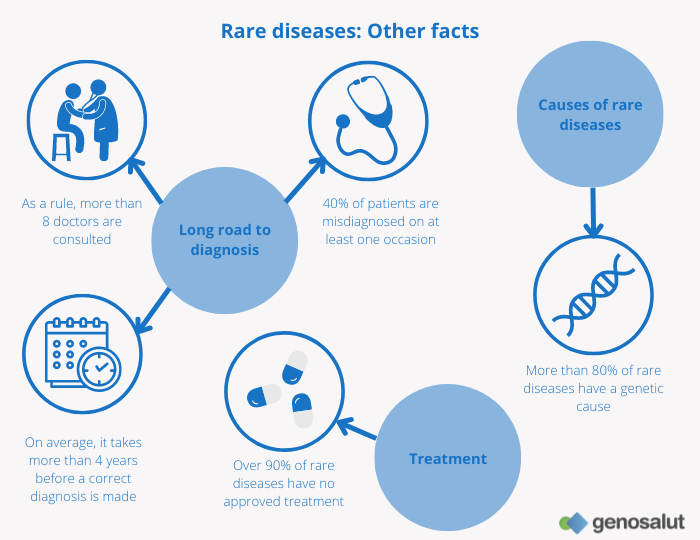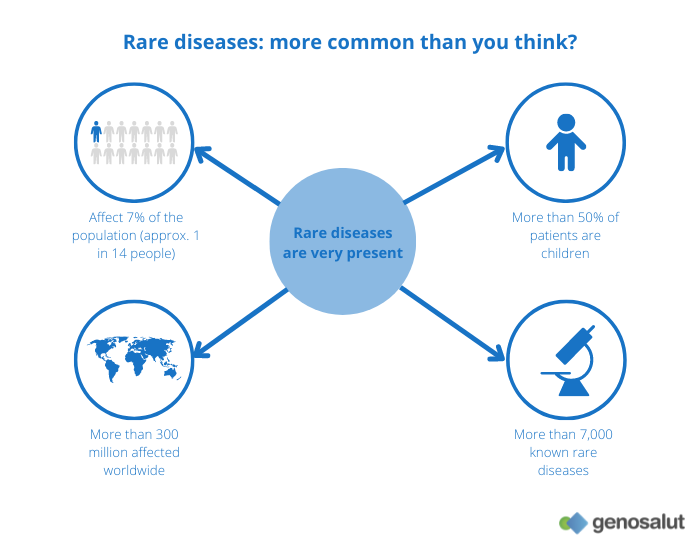Genetic testing for rare diseases
Which rare diseases do we analyse?
We are currently working on updating the website and we have more genetic tests available. If you do not find what you are looking for, please contact us through our contact form or call us on +34 616 59 01 65 from Monday to Friday from 9.00 am to 1.00 pm.
What are rare diseases?
Rare diseases are diseases that affect a small number of people compared to the general population. As a general rule, a disease is called rare if it affects fewer than 5 out of 10,000 people.
This may not seem like a lot, but in Spain some three million people suffer from one of the more than 7,000 diseases that fall under this definition. Across the EU, an estimated 30 million people are affected, equivalent to one in 20 citizens. So “rare diseases” are not so rare. However, there are only very few cases of each disease individually, and most of those affected are children. The diseases are very diverse: rare types of cancer, diseases of the cardiovascular system, metabolic, nervous, infectious and autoimmune diseases.
They are usually life-threatening or long-term debilitating diseases, usually with a high level of complexity.
What genetic tests for rare diseases do we offer at Genosalut?
At Genosalut we offer different genetic tests for the detection of mutations associated with rare diseases such as Andrade disease, Noonan syndrome, Fabry disease…
Familial mutation
Study of a particular mutation, suspected from family history, associated with the rare disease in question by Sanger sequencing or fragment analysis.
Point mutation
Study of a particular mutation associated with the rare disease in question by Sanger sequencing or fragment analysis.
Exome
Sequencing of all genes by next generation sequencing (NGS) to determine the presence of mutations associated with the rare disease in question.
Genome
Sequencing of all coding (gene) and non-coding regions by next generation sequencing (NGS) to determine the presence of mutations associated with the rare disease in question.
Our value proposal
Experience
At Genosalut, we have more than 10 years of experience in counselling people with conditions where a genetic cause has been identified or is thought to be possible.
Proximity
We are a close laboratory, we respond personally and we take the time to explain the report in detail to doctors and patients.
Professional interpretation of results
Because of our knowledge and experience, we are able to accurately interpret genetic results and offer professional advice.
Reference in the field
We are the point of contact for patients, doctors and clinics in all areas of human genetic diagnostics and prevention.
What is the cause of rare diseases?
Most rare diseases (around 80%) are genetic. In these cases, the cause is usually:
- Changes (mutations) affecting a single hereditary trait, so-called monogenic diseases
- Changes affecting a section of a chromosome (deletions, duplications, inversions)
External environmental influences (difficult birth, infections, accidents, environmental influences, etc.) are not among the main causes of rare diseases although they do have an influence on their onset and progression.
Many of these rare diseases are so-called dysmorphic and retardation syndromes as they result in a developmental disorder or disability that usually begins in childhood, but sometimes does not manifest itself until adolescence or adulthood.
Many of these genetic mutations can be passed from generation to generation, which explains why some rare diseases are familial. Other mutations appear de novo in the affected person. These are mutations that arise for the first time either in a germ cell (egg or sperm) from a parent, or mutations that arise directly in the zygote during early embryogenesis.

FAQs
How many rare diseases are there in the world?
Although there are no official figures, according to WHO (World Health Organisation) data, there are approximately 7,000 rare diseases affecting 7% of the world’s population. In other words, rare diseases as a whole affect a considerable number of people.
In total, it is estimated that in Spain there are more than 3 million people with rare diseases.
When should the possibility of a rare disease be considered?
Due to its heterogeneity, there are many symptoms that may indicate the presence of a rare disease, among the most common are:
- Disorders of physical and mental development
- Short and tall stature
- Neuromuscular deficiencies
- Metabolic disorders
What diagnostic options are available?
As the name suggests, these are rare diseases whose clinical pictures are often poorly understood. This is why, when symptoms appear that may indicate the presence of a rare disease, the appropriate diagnostic tests should be carried out in order to begin optimal care and therapy.
Advances in various scientific fields, especially in genetics, make it possible to identify the cause of an increasing number of these diseases and to make the correct diagnosis. Genetic studies to diagnose rare diseases include:
- Single gene analysis: In case of suspicion of a specific rare disease, either by symptomatology, traits and/or family tree, analysis of specific mutations in certain genes known to be associated with the disease in question can be performed.
- Exome or genome: In cases where the symptomatology, traits and family tree cannot be associated with a specific rare disease, it is advisable to perform an exome or genome analysis. These are genetic studies that make it possible to analyse all the genes of an individual (exome) or all the nuclear DNA of an individual (genome). This significantly increases the probability of identifying the mutation(s) that may be the cause of the rare disease.
Why are rare diseases known as orphan diseases?
In this case the adjective orphan takes on the meaning “lacking a necessary thing, quality or characteristic; especially some kind of protection or help that should be available to them”. Because they are individually very rare diseases, knowledge about the causes, symptoms and treatment options for these diseases is limited. Likewise, they are of low economic interest and there is little investment in new diagnostic and therapeutic techniques.
Why is drug therapy difficult in many cases?
As mentioned in the previous section, these diseases are of little interest. That is, the lack of basic and clinical research means that the causes and mechanisms underlying rare diseases are barely known.
On the occasions when some data exists, there are often no therapies or drugs to treat the specific disease. The main reasons for this are:
- The difficulty for the development of a drug for a rare disease, as it has to be carried out in a very small group of affected people.
- Lack of economic interest, as they are drugs with low profitability. In other words, they are not very lucrative products for pharmaceutical companies.
- The lack of basic and clinical research.
What are rare diseases? Types of rare diseases
Rare diseases form a very heterogeneous group of clinical pictures, most of which are complex and usually have a chronic course. They range from mild anomalies to severe disabilities and malformations, which are the most frequent.
Although there is no official classification, they can be grouped, for example, according to the part, apparatus or system of the organism they affect. Thus we find:
- Deformities and disabilities: Hutchinson-Gilford’s progeria, Fragile X syndrome, Prader Willi syndrome.
- Rare diseases of the digestive system: primary biliary cholangitis, dentinogenesis imperfecta, necrotising enterocolitis
- Rare diseases of the nervous system: Moebius syndrome, amyotrophic lateral sclerosis (ALS), congenital insensitivity to pain, Gilles de la Tourette’s syndrome
- Rare diseases of the skin and connective tissue: epidermolysis bullosa, Marfan syndrome, dermatitis herpetiformis
- Rare endocrine and metabolic diseases: Addison’s disease, cystinuria, AL amyloidosis
- Rare diseases of the genitourinary system: interstitial cystitis, nephronophthisis, Mayer-Rokitansky-Küster-Hauser syndrome
- Rare diseases of the immune system: common variable immunodeficiency, myasthenia gravis, severe combined immunodeficiency
- Rare diseases of the respiratory system: idiopathic pulmonary fibrosis, primary ciliary dyskinesia, tracheal stenosis
- Rare diseases of the eye: neurotrophic keratopathy, retinopathy of prematurity, Duane’s retraction syndrome
- Rare diseases of the circulatory system: pulmonary hypertension, Henoch-Schöenlein purpura, hypoplastic left heart syndrome
- Rare haematological diseases:
- Cancers: neuroblastoma, thyroid carcinoma, dermatofibrosarcoma protuberans
What are some of the problems experienced by people with rare diseases?
- Difficulty in obtaining an accurate diagnosis. This is undoubtedly one of the main problems and one that appears from the very beginning. The causes are: lack of knowledge about these diseases, the shortage of doctors or specialised centres and the absence of the necessary information.
- Delays in diagnosis can in some cases lead to a worsening that could have been avoided or at least alleviated.
- Limited and sometimes costly treatment options.
- Little or no research available on your condition.
- Difficulty in finding doctors or specialised treatment centres.
- Feeling of isolation.
When is Rare Disease Day?
28 February (or 29 February in the case of leap years) is International Rare Disease Day. This day was chosen precisely as a symbolic way of associating the rarity of leap years with these types of diseases. The aim of this day is to raise awareness of these diseases and to help people suffering from them to receive the appropriate diagnosis and treatment.
Today, many countries have joined this initiative promoted by organisations such as the European Organisation for Rare Diseases (EURORDIS) and the Spanish Federation for Rare Diseases (FEDER).
What is genetic counselling for rare diseases for?
Genetic counselling is essential for patients facing a rare disease diagnosis and their families. The genetic counsellor offers these individuals help and support and informs them about genetic testing options for the diagnosis of the disease.
Request an appointment with us
Opening hours
Monday to Friday from 9.00 am to 1.00 pm
+34 616 59 01 65
info@genosalut.com
Camí dels Reis, 308 (Clínica Palma Planas)
Contact form
Reasons for trusting Genosalut
First genetic diagnosis laboratory in the Balearic Islands
Professionals with experience in medical genetics
Detailed report of the results
Personalised attention for each patient
Wide range of genetic tests
Cutting-edge technology

